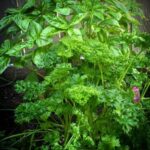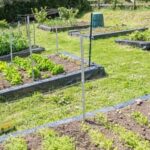Is charcoal good for vegetable gardens? Incorporating charcoal into vegetable gardens has become a popular practice among gardeners seeking natural and sustainable ways to improve soil quality and promote plant growth. Charcoal, when used correctly, can offer numerous benefits to vegetable gardens, including enhancing soil fertility, acting as a natural fertilizer, and even aiding in pest control.
In this article, we will explore the concept of utilizing charcoal in vegetable gardens and its potential benefits. We will delve into the various ways in which charcoal can positively impact the health and productivity of vegetable plants, as well as the different types of charcoal that are best suited for garden use. Additionally, we will discuss how to effectively incorporate charcoal into the soil and provide practical tips on using it for different types of vegetables.
By understanding the advantages of incorporating charcoal into vegetable gardens, gardeners can harness its potential to create thriving and bountiful harvests. Let’s explore how this natural resource can be a game-changer for cultivating healthy and productive vegetable gardens.
Benefits of Charcoal in Vegetable Gardens
Improving Soil Quality
One of the main benefits of incorporating charcoal into vegetable gardens is its ability to improve soil quality. Charcoal acts as a sponge, helping the soil retain moisture and nutrients, which can be especially beneficial in regions with dry or nutrient-poor soil. Additionally, charcoal helps to create air pockets in the soil, improving drainage and reducing compaction. This can lead to healthier root growth and overall plant health.
Promoting Plant Growth
Charcoal also has the potential to promote plant growth in vegetable gardens. The porous nature of charcoal allows for better aeration of the soil, which can enhance the uptake of oxygen by plant roots. This improved oxygenation can lead to increased microbial activity in the soil, helping plants access essential nutrients and promoting overall growth and vigor.
Enhancing Nutrient Retention
Another way in which charcoal benefits vegetable gardens is by enhancing nutrient retention in the soil. Charcoal has a high cation exchange capacity (CEC), meaning it can hold onto essential nutrients such as nitrogen, phosphorus, and potassium and release them slowly over time as needed by plants. This can help prevent nutrient leaching and ensure that plants have access to the nutrients they need for healthy growth.
Types of Charcoal
When it comes to using charcoal in vegetable gardens, there are different types of charcoal that can be used for various purposes. Each type of charcoal offers unique benefits and can cater to different needs in a vegetable garden setting.
Biochar
Biochar is a type of charcoal that is manufactured through the process of pyrolysis, which involves heating biomass in a low or zero-oxygen environment. This results in a highly porous form of charcoal that is rich in carbon. When added to the soil, biochar can improve the soil’s structure, increase water retention, and provide a habitat for beneficial microorganisms. It also helps to mitigate climate change by sequestering carbon.
Lump Charcoal
Lump charcoal is made from natural hardwood such as oak, hickory, or maple. Unlike briquettes, lump charcoal contains no additives or binders. When used in vegetable gardens, lump charcoal can enhance soil aeration and drainage while also providing a long-lasting source of slow-release nutrients for plants.
Activated Charcoal
Activated charcoal is produced by heating carbon-rich materials such as wood or coconut shells at high temperatures. The resulting activated carbon has an incredibly large surface area, allowing it to effectively absorb toxins and impurities from the soil. In vegetable gardens, activated charcoal can help detoxify the soil and prevent harmful chemicals from harming plants.
Overall, each type of charcoal offers distinct advantages for vegetable gardens and can be used strategically based on specific gardening goals and needs. Whether it’s improving soil quality with biochar or detoxifying the soil with activated charcoal, incorporating these types of charcoal into vegetable gardens can have numerous benefits for plant growth and overall garden health.
How to Use Charcoal in Vegetable Gardens
Incorporating charcoal into the soil of your vegetable garden can provide numerous benefits, such as improving soil quality, promoting plant growth, and even acting as a natural fertilizer. To get started, first determine the type of charcoal that will best suit your garden’s needs.
There are various options available, including biochar, lump charcoal, and activated charcoal, each with its own unique properties and benefits. Once you have selected the appropriate type of charcoal for your garden, it’s important to understand how to use it effectively.
To begin incorporating charcoal into the soil of your vegetable garden, start by preparing the planting area. Dig a hole or trench for planting your vegetables and mix the charcoal thoroughly into the soil. The amount of charcoal to use will depend on the type of vegetable you are planting and the condition of your soil. As a general guideline, aim to incorporate about 5-10% by volume of charcoal into your soil mixture.
For vegetables that prefer acidic soils, such as tomatoes or peppers, consider using biochar as it can help balance pH levels and improve nutrient retention. For those growing leafy greens like lettuce or spinach, lump charcoal can be effective in enhancing moisture retention and providing essential nutrients to promote healthy growth. Regardless of which type of charcoal you choose, it’s important to monitor the effects on your plants closely and make adjustments as needed based on their individual responses.
By following these step-by-step instructions for incorporating charcoal into the soil and understanding how much to use for different types of vegetables, you can harness the benefits of this natural growing medium in your own vegetable garden. With proper application and monitoring, you may find that using charcoal in your garden leads to improved soil fertility, healthier plant growth, and ultimately a bountiful harvest of fresh produce.
Charcoal as a Natural Fertilizer
Charcoal is a natural material that has been used for centuries as a soil amendment due to its ability to act as a natural fertilizer for vegetable plants. It is rich in carbon and essential nutrients, making it an ideal additive for improving soil quality and promoting plant growth in vegetable gardens. When incorporated into the soil, charcoal helps retain moisture, improve drainage, and enhance nutrient retention, all of which are crucial for healthy vegetable plants.
One of the main benefits of using charcoal as a natural fertilizer in vegetable gardens is its ability to increase the cation exchange capacity (CEC) of the soil. CEC refers to the soil’s ability to retain and exchange essential nutrients for plant growth.
Charcoal has a high CEC value, which means it can effectively hold onto important nutrients like potassium, calcium, magnesium, and phosphorus and release them to plants as needed. This can result in healthier and more robust vegetable plants with improved yields.
In addition to its nutrient-rich properties, charcoal also helps create a favorable environment for beneficial microorganisms in the soil. These microorganisms play a vital role in breaking down organic matter into nutrients that plants can absorb. By promoting healthy microbial activity in the soil, charcoal contributes to overall soil fertility and plant health in vegetable gardens.
| Benefit | Description |
|---|---|
| Increased Cation Exchange Capacity (CEC) | Charcoal has a high CEC value, allowing it to retain and release essential nutrients for plant growth |
| Promotion of Microbial Activity | Charcoal creates an environment conducive to beneficial microorganisms that break down organic matter into plant-available nutrients |
Charcoal and Pest Control
Charcoal can be a valuable tool in pest control for vegetable gardens, as it possesses properties that can help deter pests and protect plants from insects and other harmful organisms. Here are some ways in which charcoal can be used for pest control in vegetable gardens:
- Deterring Insects: Charcoal can act as a natural barrier to insects and pests due to its rough texture and porous nature, making it difficult for these organisms to navigate through the soil around the plants.
- Absorbing Harmful Chemicals: Activated charcoal has the ability to absorb and neutralize harmful chemicals and toxins in the soil, which may attract pests or harm the vegetable plants.
- Neutralizing Odors: Charcoal can help neutralize odors that may attract pests to the garden, creating a less appealing environment for them to thrive.
When using charcoal for pest control in vegetable gardens, it is essential to understand how to effectively incorporate it into the growing medium. This includes:
- Mixing charcoal into the soil around the base of the plants
- Creating a charcoal barrier around the garden beds or individual plants
- Using activated charcoal in compost or mulch to prevent pest infestations
By utilizing these methods, vegetable gardeners can take advantage of charcoal’s natural pest deterrent properties and promote a healthier growing environment for their crops.
Case Studies
Incorporating charcoal into vegetable gardens has been a growing trend among gardeners looking to boost the health and productivity of their plants. Through case studies, we can gain insight into the real-life examples of vegetable gardens that have successfully used charcoal as a growing medium and the results they have achieved. These case studies provide valuable evidence of the benefits of using charcoal in vegetable gardens.
One such case study comes from a small urban garden in an apartment complex. The garden struggled with poor soil quality and limited space, leading to stunted plant growth and low yields. After incorporating biochar into the soil, the garden saw significant improvements in plant health and productivity. The biochar helped to improve water retention and nutrient availability in the soil, resulting in larger, healthier vegetables that were more resistant to disease.
Another example comes from a community garden project that aimed to provide fresh produce for local residents. By using lump charcoal as a soil amendment, the community garden was able to increase its vegetable yield by over 50% in just one growing season. The improved soil structure and increased nutrient retention provided by the lump charcoal allowed for more robust plant growth, ultimately leading to a greater harvest for the community members.
These case studies serve as compelling evidence for the effectiveness of using charcoal as a growing medium in vegetable gardens. They demonstrate how integrating charcoal into garden soils can lead to healthier plants, increased yields, and overall improvement in gardening success. By learning from these real-life examples, other gardeners can be inspired to explore the potential benefits of incorporating charcoal into their own vegetable gardens.
Conclusion
In conclusion, incorporating charcoal into vegetable gardens can provide a range of benefits that contribute to healthy plant growth and bountiful harvests. From improving soil quality to acting as a natural fertilizer and deterring pests, charcoal offers a natural and sustainable way to enhance the health and productivity of vegetable gardens. Whether using biochar, lump charcoal, or activated charcoal, gardeners have a variety of options for integrating this beneficial material into their gardening practices.
Overall, the nutrient-rich properties of charcoal make it an attractive option for vegetable gardeners looking to boost the health and vitality of their plants. By following the step-by-step instructions for incorporating charcoal into the soil and adjusting the quantity based on the type of vegetables being grown, gardeners can optimize its benefits. Additionally, real-life case studies have shown successful results in using charcoal as a growing medium, further demonstrating its potential impact on vegetable garden performance.
In summary, while there are various types of materials used for gardening and fertilizing vegetables, the benefits of using charcoal are clear. Its ability to improve soil quality, act as a natural fertilizer, and deter pests make it a valuable asset for any vegetable garden. By considering the different types of charcoal available and implementing best practices for its use, gardeners can experience firsthand the positive effects it can have on their gardening endeavors.
Frequently Asked Questions
Is Charcoal Good for Growing Vegetables?
Charcoal can be beneficial for growing vegetables as it helps improve soil drainage and aeration. It also acts as a natural filter, absorbing impurities and toxins from the soil. When incorporated into the garden bed, charcoal can help retain moisture and nutrients, creating a more fertile environment for vegetable plants to thrive.
How Do I Add Charcoal to My Garden?
To add charcoal to your garden, you can simply crush or grind up the charcoal into small pieces and mix it into the soil. Alternatively, you can sprinkle a layer of crushed charcoal at the bottom of planting holes or trenches before adding soil or compost.
It’s important to space out the charcoal evenly throughout the garden bed to ensure even distribution and benefits for all vegetable plants.
Can You Use Burnt Charcoal in Garden?
Yes, burnt charcoal can be used in the garden. However, it’s important to use natural lump charcoal without any chemical additives or lighter fluid residue.
The burnt charcoal should be thoroughly extinguished and cooled before being added to the soil as it can retain heat for long periods of time. By using burnt charcoal in the garden, you can still benefit from its ability to improve soil quality and promote healthier vegetable growth.

If you’re looking to get into vegetable gardening, or are just looking for some tips on how to make your current garden better, then you’ve come to the right place! My name is Ethel and I have been gardening for years. In this blog, I’m going to share with you some of my best tips on how to create a successful vegetable garden.





